Online chemical engineering masters programs can help prepare you for advanced positions in the field of engineering.
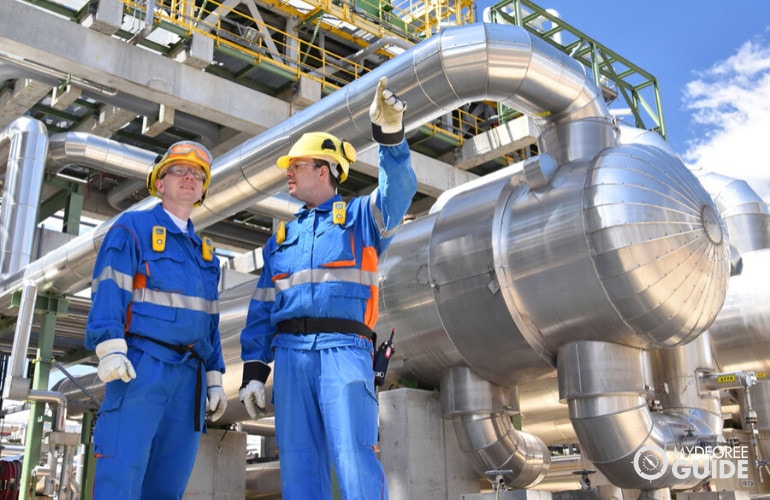
Common career paths include chemical engineer, engineering manager, community college instructor, and chief engineering officer.
Editorial Listing ShortCode:
If you take an interest in how chemicals and other materials play a role in manufacturing processes, then a masters in chemical engineering program may be a good fit for you.
Universities Offering Online Masters in Chemical Engineering Degree Programs
Methodology: The following school list is in alphabetical order. To be included, a college or university must be regionally accredited and offer engineering degree programs online or in a hybrid format.
Columbia University
Columbia University offers a Master’s in Chemical Engineering online program. To graduate, students must complete 30 credits with a 2.5 GPA within 5 years of taking their first course.
To be eligible for the program, students must have an undergraduate degree in chemical engineering, a minimum GPA of 3.0, and 3 recommendation letters.
Columbia is accredited by the Middle States Commission on Higher Education.
Lehigh University
Lehigh University offers a Masters in Chemical Engineering online program. It can typically be completed in 3 years and requires 30 semester hours. At least 15 of the semester hours must be from 400 level courses related to chemical engineering.
Students interested in the program must have an undergraduate in a related field with a minimum GPA of 3.0 and 2 letters of recommendation.
Lehigh University is accredited by the Middle States Commission on Higher Education.
North Carolina State University
North Carolina State University offers a Master of Science in Chemical Engineering online program. Students must complete 30 credits to graduate.
To apply to the program, students must have a bachelor’s degree with a minimum 3.0 GPA. Students who don’t have a background in chemistry may take two separate courses to gain the necessary background.
North Carolina State University is accredited by the Southern Association of Colleges and Schools Commission on Colleges.
Stanford University
Stanford University offers a part-time, fully online Masters of Science in Chemical Engineering program. To graduate, students must complete 45 units within 5 years of starting the program.
Required courses include 8 graduate level classes in chemical engineering, a seminar on engineering, and 18 graduate level elective courses.
Stanford University is accredited by the Accrediting Commission for Senior Colleges and Universities of the Western Association of Schools and Colleges.
University of Southern California
The University of Southern California offers a Master of Science in Chemical Engineering online program. A total of 28 units must be completed with a minimum 3.0 GPA to graduate
To be eligible for the program, students must have an undergraduate degree in engineering, GRE scores, and 3 letters of recommendation.
The University of Southern California is accredited by the Western Association of Schools and Colleges, the Senior College and University Commission.
Online Masters in Chemical Engineering Programs
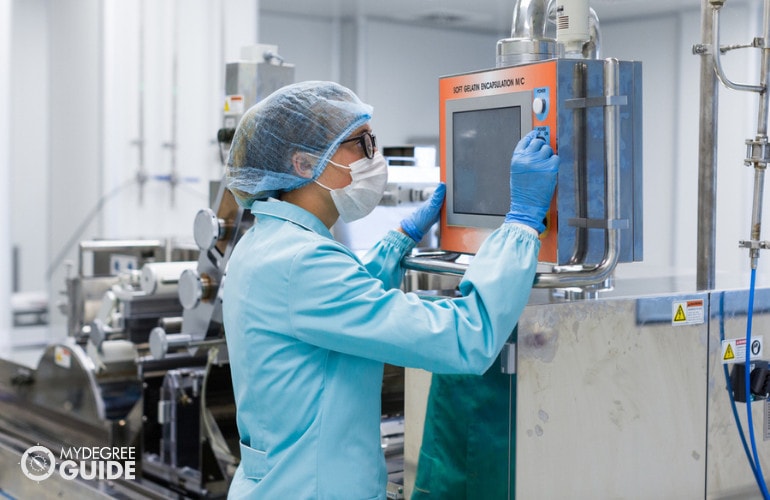
Online masters in chemical engineering programs can help equip you to pursue a career in the lucrative field of engineering, much like an online masters in aerospace engineering or one in mechanical engineering can.
Common careers in this field include chemical engineer, project manager, health and safety engineer, postsecondary teacher, engineering manager, and chief engineering officer.
Becoming a chemical engineer is a popular career path for graduates. Chemical engineers are typically responsible for designing manufacturing processes for a variety of products, such as energy products, electronics, food, and clothing.
Chemical engineers can be required to handle a number of volatile and dangerous chemicals and materials as part of their role. As part of your studies, you may be exposed to ideas stemming from chemical engineering, applied mathematics, data analysis, optimization of operations and systems, leadership and management, and energy.
Specific course topics may include:
- Applied mathematics in chemical sciences
- Molecular thermodynamics
- Chemical kinetics
- Biochemistry
- Polymer engineering
- Engineering design optimization
- Control design techniques
- Energy materials, solar cells, and fuel cells
Depending on the program you choose to attend, you may have the opportunity to enroll on a part-time or full-time basis. While full-time studies can generally be completed faster, part-time study options may allow you to better balance other life demands, such as work or family responsibilities.
Some chemical engineering masters degree programs require you to complete a thesis-option or project-option as part of your degree.
Chemical Engineering Careers & Salaries
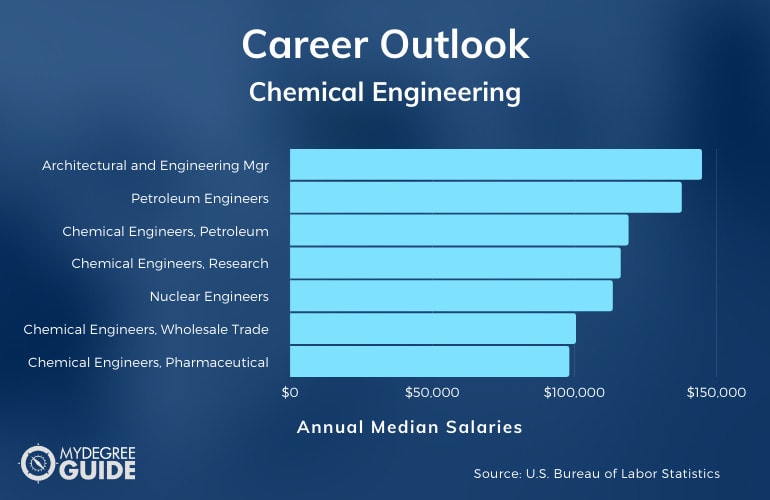
Chemical engineering MS programs can help prepare you for a career working in a number of different industries and work environments.
These industries include engineering service firms, research and development facilities, petroleum and coal production centers, and pharmaceutical manufacturing. Depending on the type of work you’re required to perform, you may work in an office setting, a lab, or in the field or on a job site.
According to the Bureau of Labor Statistics, an online Master of Science in Chemical Engineering program can help prepare you for various careers or advancement in the field of engineering.
| Careers | Annual Median Salaries |
| Architectural and Engineering Managers | $144,830 |
| Petroleum Engineers | $137,720 |
| Chemical Engineers, Petroleum and Coal Products Manufacturing | $119,010 |
| Chemical Engineers, Research and Development | $116,250 |
| Nuclear Engineers | $113,460 |
| Chemical Engineers, Wholesale Trade | $100,510 |
| Chemical Engineers, Pharmaceutical and Medicine Manufacturing | $98,160 |
| Health and Safety Engineers | $91,410 |
| Environmental Engineers | $88,860 |
| Chemist and Materials Scientists | $78,790 |
The Bureau of Labor Statistics predicts that several positions in the field of chemical engineering are predicted to experience growth in the next ten years. These positions include engineering manager (3%), chemical engineer (4%), health and safety engineer (4%), and chemist and materials scientist (5%).
Chemical Engineering Master’s Curriculum
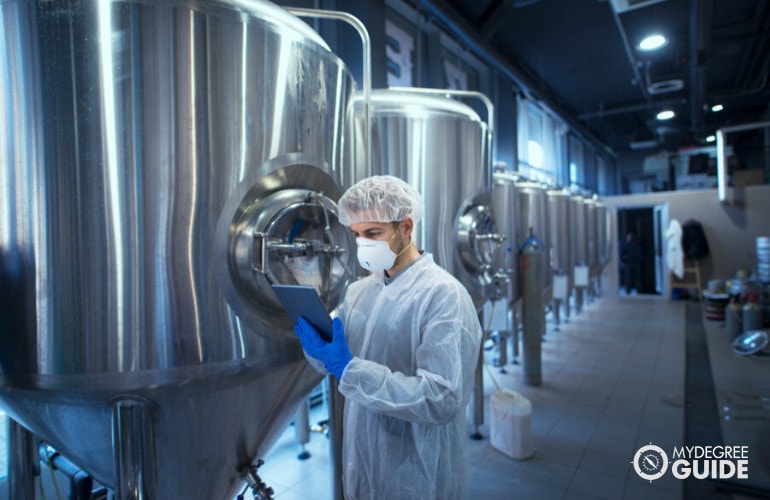
The course curriculum in a chemical engineering master’s program can cover a blend of topics, ranging from systems optimization and leadership to engineering principles, energy, and mathematics. Some courses may include:
- Air Pollution Control: This course is a review of common air pollutants and various control measures to address emissions issues.
- Chemical Engineering Thermodynamics: You’ll take an advanced look at the relationship between heat and various forms of energy.
- Combustion Theory: This course is an overview of modeling principles related to combustion, including pollutant formation and diffusion flames.
- Design of Engineering Experiments: This course is a review of best practices in the design of experiments and analysis of data in the field of engineering.
- Transport Phenomena: You’ll review the theory of transport phenomena, including momentum and heat transfer.
- Chemical Reactor Analysis: You’ll look at influences on reactor performance and mixing effects.
- Applied Engineering Mathematics: This course is an overview of mathematical principles and solutions used in the execution of engineering functions.
- Advanced Polymer Science: You’ll review key principles in polymer science, including synthesis, kinetic reactions, and systems.
- Biochemical Engineering: You’ll study the application of bioprocesses in various production settings.
- Industrial Waste Treatment: This course is an examination of methods used in the treatment of industrial wastewater.
The specific courses offered as part of a chemical engineering curriculum vary from one school to the next.
Chemical Engineering Master’s Degree Admissions Requirements

While admission requirements for online chemical engineering graduate programs can vary depending on the school, the following are common criteria:
- Bachelor’s degree. In some cases, schools may require that your degree is from a program related to chemical engineering.
- Resume. You’ll typically submit a copy of your resume with any previous academic and work experience.
- Letter of intent. Many programs request a letter of intent or interest that details your academic and professional background along with your interest in the program.
- Letters of recommendation. Schools often request reference letters from former academic or workplace supervisors.
GRE and GMAT scores are becoming a less common requirement, but some schools may still request them.
Accreditation

Regional accreditation is an important consideration when pursuing an online master’s degree in chemical engineering. The accreditation status of an academic institution and program verifies that their educational content is of high quality and meets a certain set of predetermined standards.
Your program’s accreditation status may influence your ability to secure a rewarding position. It can also impact your ability to transfer credits or enroll in a PhD program down the road. For more information about the accreditation status of programs you’re interested in attending, you can visit the US Department of Education‘s website.
Financial Aid and Scholarships

There are a number of financial aid opportunities available to graduate students who qualify. Financial aid options include federal and state grants, loans, work-study programs, and scholarships. Scholarships can also be made available by various private organizations, and they may also be offered by the school you choose to attend.
If you’re employed while pursuing your online master’s degree in chemical engineering, you may also have the opportunity to benefit from training program funding. If your work offers this type of program, your employer might pay a portion of your tuition costs.
For more information on financial aid options that you may qualify for, you can visit the US Department of Education‘s website.
What Can You Do with a Masters in Chemical Engineering?
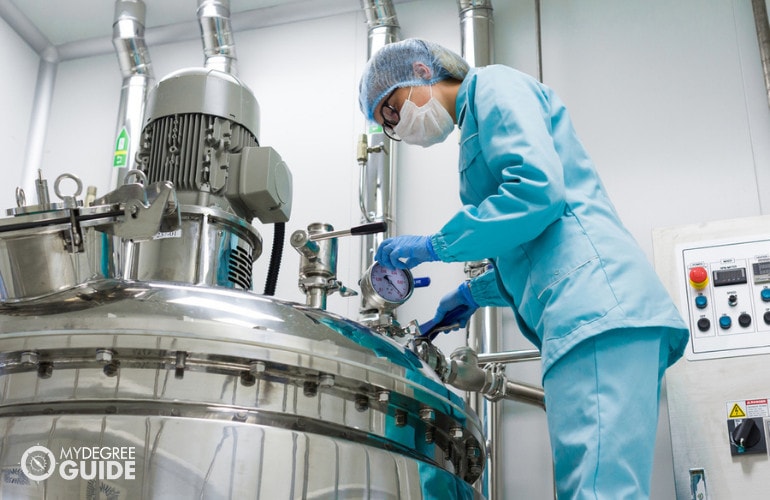
A masters degree in chemical engineering online program can help prepare you for a number of positions in the field. Common careers in the field include engineering manager, chemical engineer, environmental engineer, and petroleum engineer.
Other positions that graduates pursue include health and safety engineer, chemist and materials scientist, and occupational health and safety specialist. Many community colleges also accept teaching applicants with an advanced degree.
What’s the Difference Between Chemical Engineering vs. Chemistry?
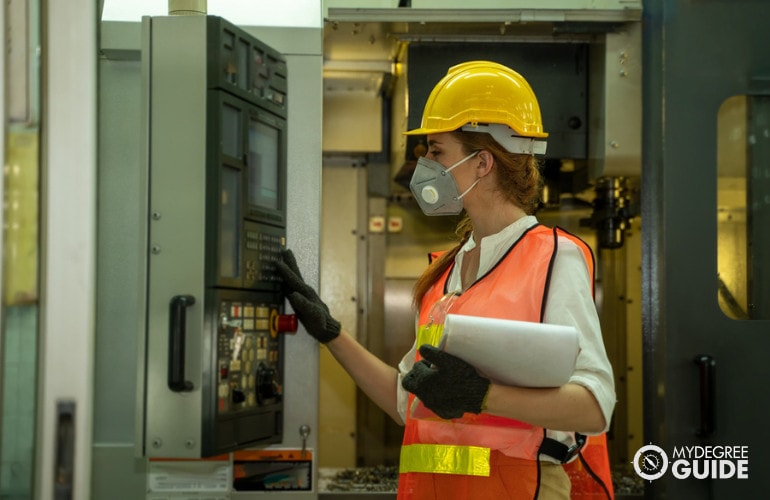
While chemical engineering and chemistry have some overlapping aspects, there are key differences between the two professional fields.
Chemistry generally involves:
- Dealing with extensive research
- Handling chemical substances
- Handling chemical reactions
- Working in laboratories
Common industries for chemist positions include research facilities, testing laboratories, federal and state government institutions, waste management centers, and chemical manufacturing plants.
Chemical engineering, on the other hand, focuses on using materials and chemicals and turning them into valuable products that can be used for equipment and machinery.
What’s the Difference Between Chemical vs. Mechanical Engineering?
Many components of chemical and mechanical engineering intersect, but the key differences between the two specialties include the following:
| Chemical Engineering | Mechanical Engineering |
| Emphasizes the manufacturing process of product development | Focuses on the development and testing of machines and devices used in product development |
| Works more closely with chemicals and dangerous substances | Works more closely with technical and mechanical issues for machinery |
Both chemical and mechanical engineering play an important role in the development of products.
What’s the Difference Between Bioengineering vs. Chemical Engineering?
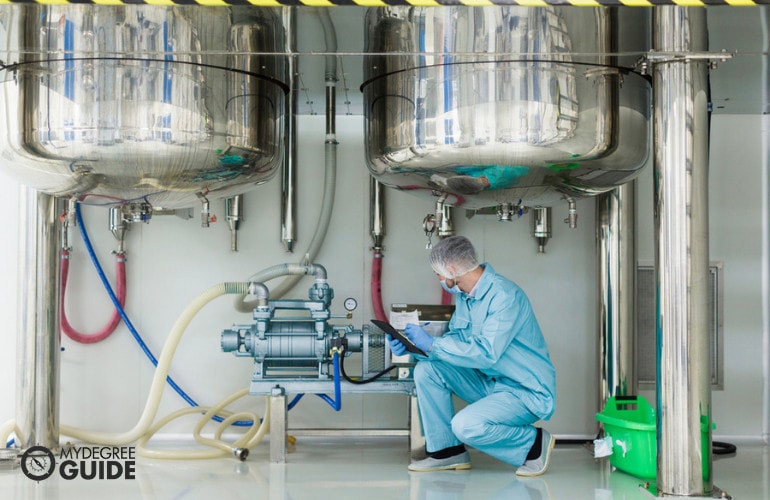
Bioengineering focuses on the design and development of biomedical equipment and devices, such as artificial organs or diagnostic machinery.
It is common for bioengineers to work in the following industries:
- Research and development
- Academia
- Medical equipment manufacturing
- Electromedical and control instrument manufacturing
- Healthcare
Chemical and bioengineers can work together on certain projects, and their work may complement one another’s.
Is a Masters in Chemical Engineering Worth It?
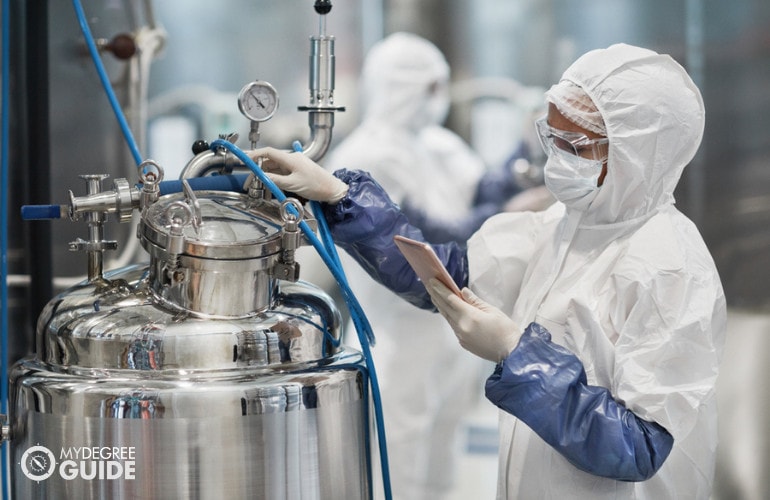
Yes, a masters in chemical engineering is worth it for many students. Topics of study can include air pollution controls, design of engineering experiments, chemical engineering thermodynamics, combustion theory, and theories on explosives.
Earning an online MS in Chemical Engineering can help prepare you for a variety of roles. Common careers in this field include engineering manager, chemical engineer, health and safety engineer, occupational health and safety specialist, and chemist and materials scientist.
The Bureau of Labor Statistics predicts that employment for architecture and engineering occupations will experience 3% job growth in the next decade. Chemical engineer positions in particular are expected to have 4% job growth.
Getting Your Chemical Engineering Masters Online

Pursuing an online masters in chemical engineering can help you develop the expertise and skill required to qualify for rewarding positions in the field of engineering.
With your degree, you may be well suited to play a role in the manufacturing process of various products relating to pharmaceuticals, petroleum, coal, and even electronics, food, and clothing.
A masters degree can also help qualify you to pursue leadership roles in the engineering field as well as teaching positions at community colleges. With an accredited masters in engineering online program, you may even be able to earn your masters while maintaining your additional work and life responsibilities.
If you’re interested in advancing in this lucrative field, you can start by exploring online chemical engineering masters programs from accredited universities.
